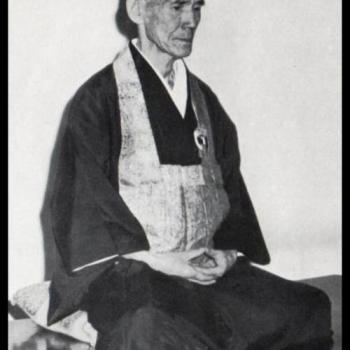I’ve previously posted my translations of excerpts from a revealing Dōgen dharma discourse (J. hogō), Eihei koroku V8.14, with brief commentaries. This hogō focuses on the importance and the role of the Zen teacher, specifically in the context of householder practice.
Going zigzag on the straight path as I tend to do, I’ve already post several sections from this hogō that are near the middle and at the end. In this post, I go back to the beginning. And after more playing around with this, I see that it will work best to divide the hogō into nine sections. I’ve already posted #5, #8, and #9.
With this post, I begin again with #1 and offer a translation with some of my thoughts. I will get to the remaining five sections soon and I’ll share them as soon as they are ready to serve.
It seems to me, fortunately, that each section happens to work pretty well as a stand alone piece and hope you find that too.
Click here to support my Zen teaching practice at Patreon of which translations and writings like this are one facet. You will also find an advertisement free version of this post there too.
Translation
Ministers and generals who study the Way, first inquire of a teacher. Depending on whether the teacher is false or true, the student’s self understanding will be twisted or straight. Therefore, one practitioner turned away from the place of selecting government officials, and went to the place for selecting Buddhas. Thus, an empty mind passed the imperial exam. Inquire directly from superior teachers, directly obtain their understanding. Don’t serve as the companion for the ten thousand dharmas. Before one heard the three calls, they had broken through subtle karmic impressions. An authentic teacher influences the expression of the power of compassion.
Comments
The one thing that stands out immediately from this hogō excerpt is its density. Not unusual for Dōgen, of course, but there’s no sign of a shift in pedagogical strategies for householders! In just 78 characters, less than 100 words in translation, Dōgen includes three Zen references and one technical dharma term.
“Ministers and generals,” as I pointed out earlier in the series, probably refers to Dōgen’s main patron, Hatano Yoshishige (d. 1258) and his associates. Yoshishige later provided the land for Dōgen’s monastery, Eiheiji. In any case, Dōgen here is clearly addressing householders.
Given the density of Dōgen’s presentation, I wonder if these ministers and generals were following what he was saying. It could be that upper class folks were very well educated or already quite steeped in the dharma … or that Dōgen was marching to a different drummer than a modern teacher, and expecting his listeners to come to where he was at rather than primarily offering up something at their level.
In any case, the first Zen reference is this: “Therefore, one practitioner turned away from the place of selecting government officials, and went to the place for selecting Buddhas. Thus, an empty mind passed the imperial exam.”
Dōgen here is probably thinking about Dānxiá, a ninth generation successor of Shítóu Xīqiān. As a young man and avid scholar, Dānxiá was on his way to take the civil service exam when he had a dream of white light filling his room. A fortune teller told him this was an omen of resolving emptiness. He then met a monk who referred him to Mǎzǔ who then referred him on to Shítóu. There are many instances of practitioners going back and forth from Mǎzǔ to Shítóu and from Shítóu to Mǎzǔ.
The sentence about the empty mind passing the exam is an example of Dōgen’s subtle and dry sense of humor.
The second reference the Zen narrative comes in the next sentence. Dōgen picks up where he left off with Mǎzǔ, but now Mǎzǔ tells the householder, Layman Páng, “Don’t serve as the companion for the ten thousand dharmas,” in other words, don’t linger in witness consciousness.
The third Zen references is “Before one heard the three calls….” This refers to the following kōan: “The National Teacher called his attendant three times. Three times the attendant answered. The National teacher said, ‘Requesting you to speak, I thought I was letting you down. Turns out, the fact is that you were letting me down.’”
This theme – the teacher and/or the student letting the teacher and/or student down – is one that comes up regularly in classical Zen and Dōgen’s teaching … and also in contemporary teacher-student relationships. In the Harada-Yasutani kōan shitsunai, we address this issue in the No Gate Barrier, Case 17: The National Teacher’s Three Calls and other places too.
The technical dharma term occurs in Dōgen’s one-phrase interpretation of the three-calls kōan: “they had broken through subtle karmic impressions.” “They” here refers to the attendant that had already broken through before the teacher’s call. “Subtle karmic impressions,” 一点, “refers to the extremely subtle remaining karmic impressions that which impede the practices of bodhisattvas” (see Digital Dictionary of Buddhism). It is the one speck that remains after a transformative kensho that is addressed through the calling of the Way.
Dōgen’s concluding sentence, “An authentic teacher influences the expression of the power of compassion,” highlights the importance of finding an authentic teacher so that the subtle power of the compassionate teachers presence can perfume the student’s practice.
Coming up next: contrasting false and true teachers in #2, and then in #3, the difficulty of finding and recognizing a true teacher. Stay tuned!
Dōshō Port began practicing Zen in 1977 and now co-teaches with his wife, Tetsugan Zummach Sensei, with the Vine of Obstacles Zen, an online training group. Dōshō received dharma transmission from Dainin Katagiri Rōshi and inka shōmei from James Myōun Ford Rōshi in the Harada-Yasutani lineage. He is also the author of Keep Me In Your Heart a While: The Haunting Zen of Dainin Katagiri. Dōshō’s translation and commentary on The Record of Empty Hall: One Hundred Classic Koans, was published in 2021 (Shambhala). His third book, Going Through the Mystery’s One Hundred Questions, is now available. Click here to support the teaching practice of Dōshō Rōshi.













